Developing an eye drop to treat dry age-related macular degeneration (AMD)

Dr Lisa Hill, University of Birmingham - £244,249
This project aims to develop a novel therapy for dry aged-related macular degeneration (AMD), delivered via an eye drop, which could reduce inflammation and restore cell health. The eye drop will include the recipe to make an important protein, known to be reduced in those with AMD.
What is the problem?
AMD is a condition which affects your central vision and is a leading cause of sight loss worldwide. Sight loss has a severe negative effect on a person’s wellbeing and on their independence.
The most common form of AMD, often called dry AMD, results in a slow deterioration of the cells of the macula, often over many years, as the cells die off and are not renewed. Currently, there are no licenced treatments available to people with dry AMD in the UK.
What are they doing?
Dr Hill’s team have identified a potential therapy for dry AMD using a protein found throughout the body. Using this protein, they aim to create an eye drop for people with dry AMD.
Interestingly, the levels of this particular protein are lower within the retina of people with AMD. Previous experiments have shown that this protein can restore cell health and reduce inflammation – both key aspects of dry AMD.
How can this help?
If successful, this research has the potential to treat macular disease in its early stages. Developing a therapy which targets dry AMD and prevents it from progressing to wet AMD would be of huge benefit to people with the disease. Furthermore, patients would be able to administer eye drops themselves, reducing the need for frequent hospital visits and therefore improving their quality of life.
See our other projects
Since 1987 the Macular Society has invested around £10 million in over 100 research projects.
Explore more research
Beating macular disease through funding medical research and improving the lives of those living with macular disease.




